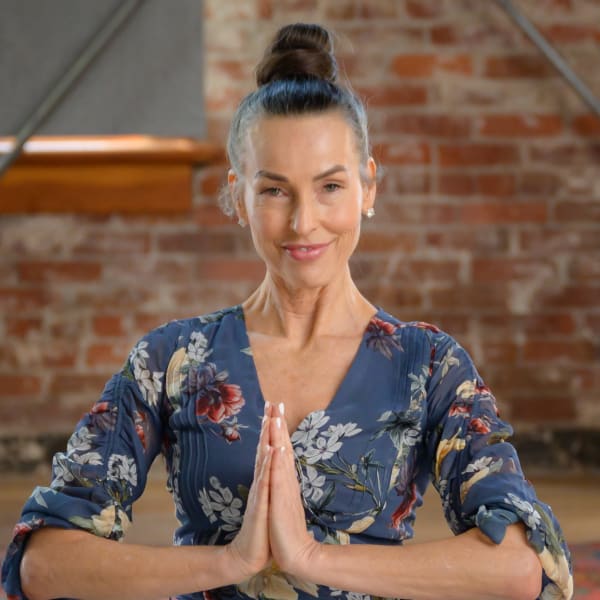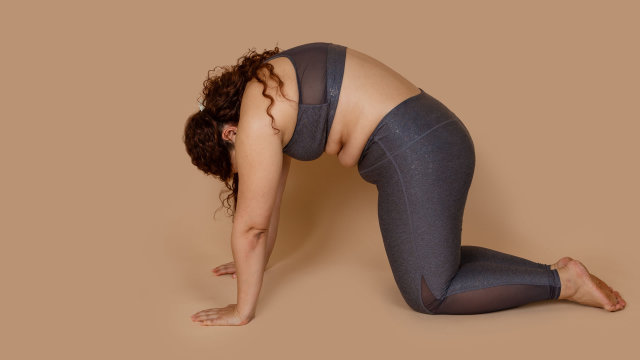Use Kundalini To Deepen Intuition

Intuition is different from thinking, logic, and analysis — it’s that feeling of knowing something for certain without knowing how.
Have you ever had a gut feeling lead you to the answer to an important question? Have you ever just suddenly known how to solve a problem that you had been agonizing over for weeks? That’s intuition.
Cultivating Calm
For centuries, the nature of intuition has inspired and confounded philosophers and psychologists alike. All human beings have access to intuition — that elusive bridge between instinct and creative flow — but to tap into it, you must learn to quiet the mind long enough to hear that inner knowing.
Not only must you listen to the intuitive insight, but also cultivate the ability to trust that inner voice to act in a way that allows you to reap the rewards.
Before practicing Kundalini yoga, I was entirely governed by my instinctual drives. I was always getting myself into situations that did not serve me. I was highly emotional, dramatic, desire-driven, and caught up in life’s highs and lows.
When torn apart by duality (seeing the world as either one way or another, without nuance), you are frequently subjected to internal judgments that can erode your self-esteem and make it difficult to have a clear mind capable of hearing your intuition. Add in stress and anxiety, and your ability to see beyond your reactive tendencies falters even more.
It doesn’t have to be this way. You can cultivate a calm that allows for the possibility of a more creative, intuitive flow state.
Learning to Listen
I had some amazing experiences practicing yoga, dance, and martial arts as a young person. These physical practices helped me improve my focus and productivity, but it wasn’t until some years later — as I became more committed to my yoga practice — that I noticed I was less reactive, too.
This was especially true when I focused on styles of practice where there was attention to breath or pranayama.
With more regular practice, I noticed I was becoming less reactive to things that would have thrown me way out of balance in the past. I was onto something, and it felt good — it felt empowering!
It wasn’t until my early 40s that I developed a deeper, more meditative mind by beginning a consistent practice of meditation kriyas that involved breath and mantra. In Kundalini yoga, we work with holding postures and dynamic movements, often coupled with breath patterns and sounds that help reset our stress response, bringing us back to a neutral, clear state.
When I embraced Kundalini yoga as a practice, I noticed even bigger changes. I found a true calm state that allowed me to see beyond that mixed-up, emotional, dualistic mind I had known before. What a relief that was!
I was activating something much more resilient, and my ability to listen and trust my inner voice of knowing was growing. I was always aware of my intuition, but I did not always have the wherewithal to act on it before practicing Kundalini yoga.
Your Body Is a Temple
The practice of Kundalini yoga begins with finding your center and getting more familiar with your body. Kundalini may assist in helping to open up the nervous system by aligning breath and movement. Teachers believe the more you practice, the more your energy centers open. With balance in the energy centers comes a deep peace and calm. We find there is no need to worry about making something happen — we begin to allow the creative flow state so that intuition can shine.
To know your body, it helps to build physical practice. Kundalini unites breath and movement, placing us on a fast track to understanding ourselves. A physical practice helps ground us. This powerful connection to breath and movement allows for a sense of being centered and secure. Here, we can fully experience our capacity, explore the edges we have created, and then develop this space and expand our boundaries. A physical practice helps carry us through this life with grace, vigor, and joy.
Our Inner Voice
Developing your intuitive faculty is incredibly important and will help bring calm to your life. Intuition is your inner guide, the voice of your soul. Intuition is a guiding star that aligns your feelings and thoughts with your most authentic self.
Through Kundalini, I found another important key was deep forgiveness and compassion — not only for others but also for myself. This deep forgiveness for self was paramount in establishing clarity and intuition. When we can compassionately forgive both ourselves and others, we can create a more profound capacity for inner guidance to shine through.
A compassionate mind and a meditative mind are very closely linked. When we use meditation to cultivate compassion, we teach our minds to calm and neutralize emotion, thoughts, and judgments and strengthen our ability to perceive beyond self-limiting beliefs.
When we develop compassion for the collective human state, we connect to something much more vast.
We chant the mantra Sat Nam in Kundalini yoga, or “original state.” Sat means “true,” and Nam means “identity” or “name.” This helps us connect to both personal and universal truth.
A Great Gift
Once you have established a regular meditation practice, commit. To develop discipline is the greatest gift to self. Over time, our systems relax, open, and flow, allowing for a clear mind and open heart to hear our inner knowing. It is thought that changing a habit takes 40 days, and Kundalini is a practice that invites us deeper.
Keep coming back to your breath and movement, and you will develop attention and focus on supporting your daily practice.
Change begets change. The more consistently you can dedicate yourself to a daily Kundalini practice, the more change you will notice — and it will be profound. After 120 days, you will not be the same person. Your body will get stronger, and your heart will grow fuller.
When you open yourself up, you can hear the intuitive voice waiting to guide you. When you dedicate time to celebrate and know yourself deeply, the reward of a more intuitive mind is yours.
Try this Roundglass course, Strengthen Your Body Through Breath, by detox and yoga specialist Kasandra Jewall to experience how kundalini-based kriya practices may help to regulate stress, allowing for more clarity and calm.









